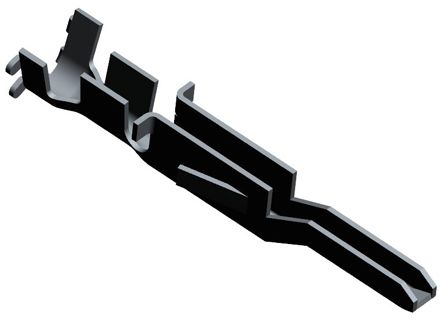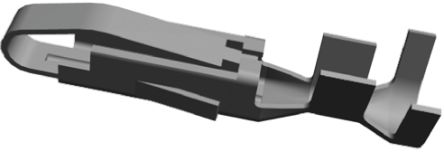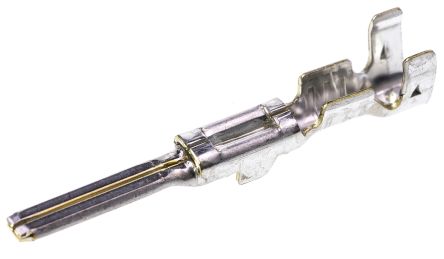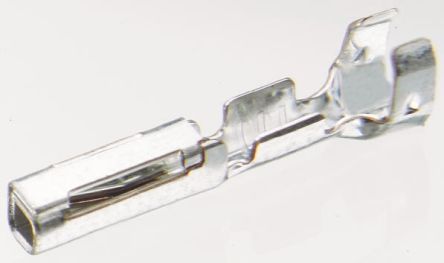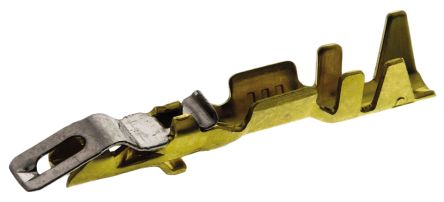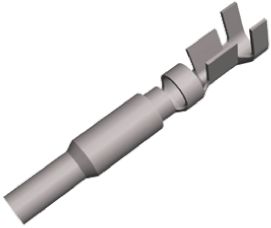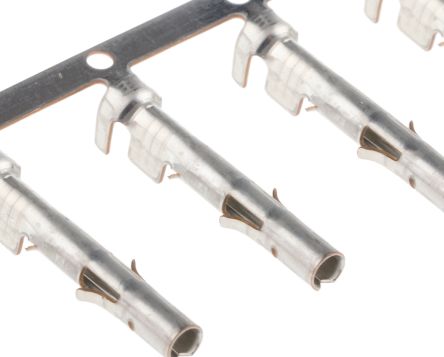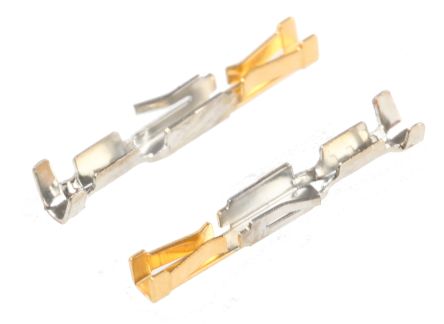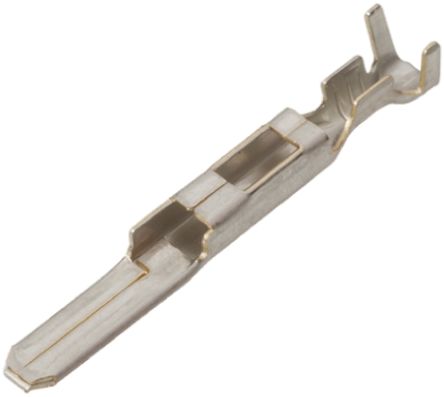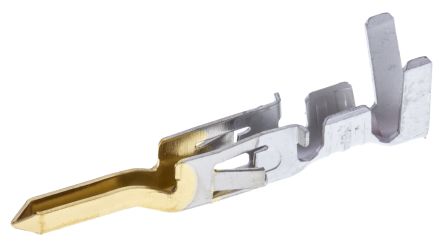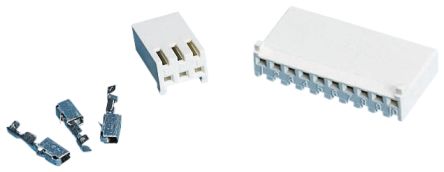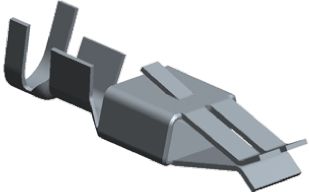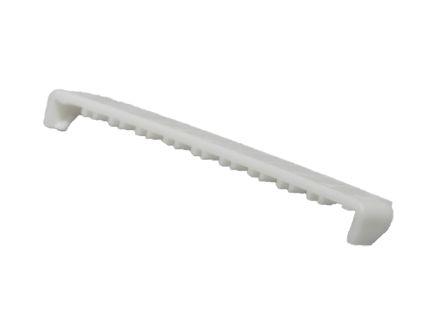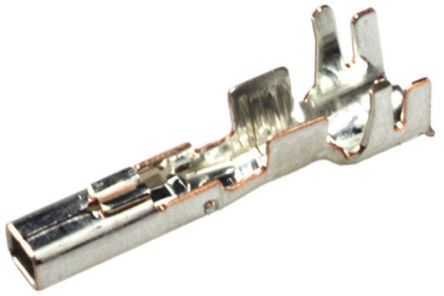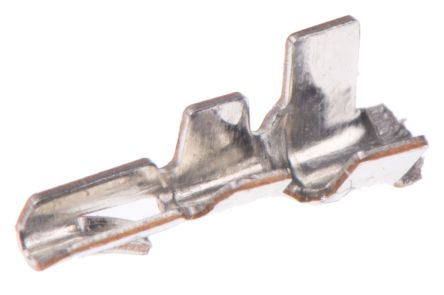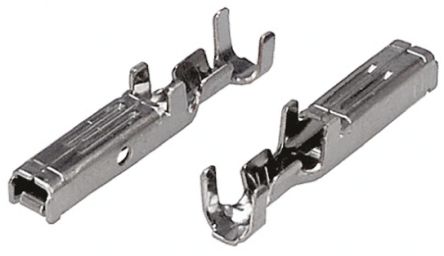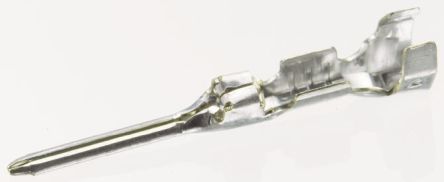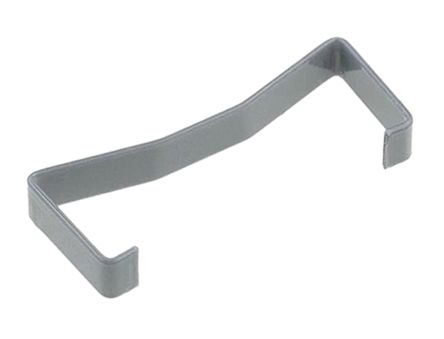- Automation & Control Gear
- Cables & Wires
- Enclosures & Server Racks
- Fuses & Circuit Breakers
- HVAC, Fans & Thermal Management
- Lighting
- Relays & Signal Conditioning
- Switches
- Batteries & Chargers
- Connectors
- Displays & Optoelectronics
- ESD Control, Cleanroom & PCB Prototyping
- Passive Components
- Power Supplies & Transformers
- Raspberry Pi, Arduino, ROCK, STEM Education & Development Tools
- Semiconductors
Crimp Contacts
Crimp contacts are essential components in printed circuit boards (PCBs), facilitating electrical connections by conducting current between contacts. These contacts come in various configurations to suit different applications. They can vary by AWG size, which determines the wire gauge compatibility, with common sizes being 22-18 AWG, 16-14 AWG, and 12-10 AWG. Tolerances in manufacturing ensure the precision and reliability of these contacts, maintaining the integrity of the electrical connection.
Crimp contacts are made from a variety of conductive materials, such as bronze, copper, and phosphor bronze, each chosen for its conductivity and durability. Contact plating options include gold, silver, and tin, which enhance the contact's performance by improving conductivity and resistance to corrosion. The choice of series and termination method depends on the specific requirements of the PCB application, with popular series including Mini-Fit, Micro-Fit, and D-Sub. Termination methods range from crimping to soldering, with crimping being favoured for its efficiency and reliability in creating secure connections.
How are crimp contacts used?
Crimp contacts are used to create circuits in general PCB applications by attaching to wires or cables. The crimping process involves compressing and reshaping the wire and connector to form a secure connection. When performed well, this method ensures a reliable and durable bond. It is crucial to use a high-quality crimp tool to achieve the best results. Crimp contacts connect to wires compatible in size, measured using the American Wire Gauge (AWG) standard or in square millimetres (mm²). Proper sizing ensures the effectiveness and stability of the electrical connection.
Crimping is favoured for its efficiency and the strength of the connection it provides. This method is widely used in various applications, from household electronics to complex industrial systems. The reliability of the crimp method makes it ideal for environments where connections are subject to vibrations and mechanical stress. Whether in telecommunications, automotive, or consumer electronics, crimp contacts offer a dependable solution for creating and maintaining electrical circuits, ensuring consistent performance and long-term durability. The use of terminal contacts in these applications highlights their critical role in ensuring secure and efficient electrical connections.
Where are crimp contacts used?
Crimp contacts provide a platform for PCB connectors to attach to. They are commonly used to make PCB sockets and for general PCB prototyping. The connector is mounted on to the printed circuit board, using the contact as an electrical connection. You will find these contacts in many electronics applications, such as household appliances, telecommunications, medical equipment, and automotive. In industrial applications, crimp contacts are used in machinery control systems, industrial automation, and energy management systems. Specific use cases include connecting sensors in automated production lines, linking components in renewable energy installations, and ensuring reliable connections in high-vibration environments like automotive and aerospace sectors.
What are crimp contacts made from?
Crimp contacts are crafted from a variety of conductive materials, each chosen for specific properties that enhance performance and reliability. Common materials include bronze, copper, and pbronze, each offering unique benefits. Bronze, an alloy of copper and tin, is known for its strength and corrosion resistance, making it ideal for harsh environments. Copper is highly valued for its superior electrical conductivity, ensuring minimal resistance and high-performance electrical connections, which are critical in sensitive electronic circuits. Phosphor bronze combines good conductivity with enhanced strength and elasticity, making it suitable for applications requiring both electrical performance and mechanical resilience.
The performance of crimp contacts can be significantly enhanced by plating them with materials like gold, silver, or tin. Gold-plated contacts offer excellent conductivity and resistance to tarnishing, making them ideal for reliable, long-lasting connections in telecommunications and medical devices. Silver plating provides even better conductivity but is more prone to tarnishing, suitable for applications where maximum conductivity is essential. Tin plating offers a cost-effective solution with reasonable conductivity and corrosion resistance, commonly used where cost is a factor, and environmental conditions are less demanding.
What is contact gender?
Crimp contacts come in different genders. Female connector contacts act like a socket, while male connector contacts act like a pin or plug.
Buying Crimp Contacts: Ordering & Delivery
RS is a trusted supplier and distributor of crimp contacts from leading brands such as Hirose, JST, Molex, and TE Connectivity. To place an order online, browse our extensive catalogue, selecting your preferred products based on specifications such as AWG size, material, and plating. Detailed product descriptions and datasheets are readily available to facilitate better-informed decisions.
RS Group offers fast delivery of crimp contacts and all sorts of other electronic components. For more details on delivery services and fees, please refer to our Delivery Page.
